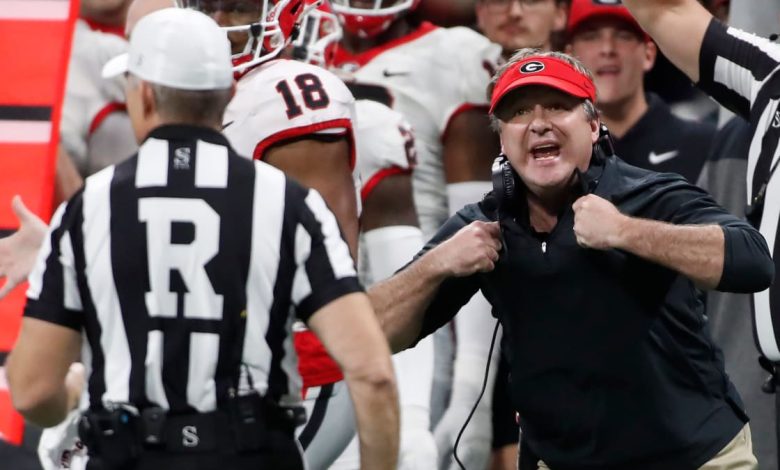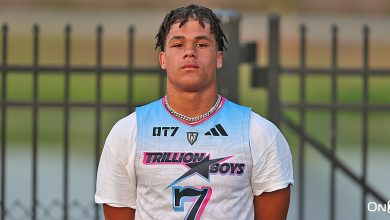Kirby Smart identifies discipline, physicality, and depth as the key factors that separate top college football teams, emphasizing Georgia’s low penalties, dominant lines, and extensive roster for sustained success.

In the ever-evolving landscape of college football, coaching philosophies and team-building strategies are crucial for sustained excellence. At the 2025 SEC Media Days in Atlanta, Georgia Bulldogs head coach Kirby Smart articulated a clear and compelling framework that distinguishes elite programs from the rest: discipline, physicality, and depth. These three pillars serve as the foundation of Georgia’s recent dominance, including back-to-back national championships since 2021, and provide a strategic roadmap for maintaining that supremacy.
This analysis delves into each of these key factors, exploring their significance, implementation, and how Georgia exemplifies these principles to stay ahead in the competitive landscape of college football.
1. Discipline: The Foundation of Consistent Performance
A. The Importance of Discipline in College Football
Discipline is often considered the backbone of a successful football team. It manifests in disciplined execution, minimal penalties, disciplined discipline in game plans, and mental toughness. Smart highlights that “great teams eliminate self-inflicted wounds—penalties, turnovers,” underscoring how discipline directly impacts game outcomes.
Teams that minimize mistakes and avoid costly penalties can maintain offensive rhythm, sustain drives, and limit opponents’ scoring opportunities. Discipline also reflects a team’s attention to detail, preparation, and mental composure—traits that differentiate champions from pretenders.
B. Georgia’s Exemplification of Discipline
Georgia’s emphasis on discipline is evident in their low penalty count—averaging just 5.2 penalties per game in 2024, one of the best figures in college football. This discipline translates into fewer turnovers, better field position, and more consistent scoring drives.
The Bulldogs’ disciplined approach is cultivated through rigorous coaching, detailed film study, and a culture that values accountability. Coach Smart’s emphasis on discipline starts from the top—setting expectations from offseason workouts through game day routines, fostering an environment where players understand the importance of executing assignments perfectly.
C. Impact on Performance and Success
Discipline’s impact is multifaceted. It reduces mistakes, keeps the team on schedule offensively, and prevents giving the opponent free yards or momentum shifts. For example, Georgia’s ability to stay within their game plan and avoid unnecessary penalties has been instrumental during high-stakes moments, such as playoff games and national championship contests.
Furthermore, disciplined teams tend to have a resilient mindset, bouncing back quickly from setbacks—crucial in the high-pressure environment of college football. Kirby Smart’s focus on discipline has helped Georgia maintain consistency amidst the intense scrutiny and physical toll of the sport.
2. Physicality: Imposing Will in the Trenches
A. The Significance of Physicality in Modern College Football
Physicality remains a cornerstone of football success, particularly in the trenches—offensive and defensive line play. Winning the line of scrimmage often dictates the outcome of games, especially in the SEC, where teams frequently battle in a war of attrition.
Physicality encompasses strength, technique, aggressive blocking, and relentless pass rushing. It’s about imposing your will on opponents, controlling the game tempo, and dictating the physical tone.
B. Georgia’s Dominance in Physical Play
Georgia’s reputation as a physically dominant team is well-earned. Led by standout players like All-SEC tackle Earnest Greene, the Bulldogs excel in controlling the line of scrimmage. Their offensive line creates running lanes for star runners and provides the protection needed for an effective passing game.
Defensively, Georgia’s front seven is known for relentless pass rush, stout run defense, and disruptive plays that set the tone for the entire team. The Bulldogs’ physicality was on display during their recent championship runs, where opponents struggled to establish a foothold against their imposing front.
C. The Strategy of Imposing Physicality
To achieve such dominance, Georgia invests heavily in strength and conditioning, recruiting physically mature athletes, and emphasizing technique that maximizes their physical gifts. Their training programs focus on building core strength, agility, and resilience to withstand the rigors of SEC competition.
Moreover, Georgia’s emphasis on physicality extends beyond individual players—it’s embedded in the team culture. Players are taught to play with aggression, toughness, and relentless pursuit of the ball, traits that are critical in close games and playoff atmospheres.
D. Impact on Game Outcomes
Physical dominance translates into control of the clock, higher yardage in rushing, and fewer breakdowns in pass protection. It also demoralizes opponents, often resulting in fewer offensive opportunities and more turnovers forced by Georgia’s aggressive front.
In high-stakes matchups, the ability to impose physicality often determines the victor. Georgia’s success in the trenches exemplifies how controlling the line of scrimmage remains a fundamental principle for elite teams.
3. Depth: Building a Sustainable Championship Program
A. Why Depth Matters
Depth provides a strategic advantage, especially in college football where injuries, fatigue, and attrition are common. Teams with a deep roster can rotate players without a drop-off in performance, maintain intensity through a grueling schedule, and adapt to game situations.
Smart emphasizes Georgia’s success in cultivating depth, particularly citing their recent No. 3 transfer portal class, which strengthened their roster across multiple positions.
B. Georgia’s Approach to Developing Depth
Georgia’s recruiting strategy focuses on acquiring versatile athletes and nurturing younger players through a robust development program. The Bulldogs’ coaching staff emphasizes player development, strength training, and situational readiness.
The transfer portal has become a vital tool for Georgia to rapidly bolster their roster, filling gaps created by graduation or injuries. Their ability to incorporate transfer players seamlessly into the team’s culture and scheme has been instrumental in maintaining depth.
C. Benefits of Depth in Sustained Success
With ample depth, Georgia can rotate players to keep athletes fresh, reduce injury risk, and maintain high energy levels throughout the game. It also allows the coaching staff to implement complex schemes that require multiple personnel packages without sacrificing effectiveness.
Additionally, depth enables the team to withstand the inevitable attrition that comes with a demanding schedule, especially during postseason play. It fosters internal competition, pushing players to perform at their best, knowing their role can be earned or lost.
D. Impact on Championship Pursuits
Having a deep roster is often the difference in close games and championship settings. Georgia’s ability to deploy a fresh wave of talented players in key moments has been a hallmark of their recent success, giving them an edge over less-deep opponents.
Integrating the Three Factors: A Holistic Approach
Kirby Smart’s emphasis on discipline, physicality, and depth isn’t coincidental—these elements are interconnected and collectively create a sustainable formula for success.
- Discipline ensures that players execute their roles efficiently, minimizing mistakes that can undermine physical dominance or deplete depth.
- Physicality provides the edge in controlling games, wearing down opponents, and establishing a dominant identity.
- Depth guarantees that the team can sustain this physical and disciplined approach over the course of a grueling season, especially in the postseason.
This holistic approach aligns with Georgia’s program philosophy, where meticulous preparation, relentless effort, and strategic roster management converge to produce championship-caliber teams.
Future Implications and the Road Ahead
As Georgia prepares for their upcoming season, including their August 30 opener against UCLA, Kirby Smart’s blueprint remains as relevant as ever. The Bulldogs’ commitment to these core principles will be instrumental in defending their titles and pursuing future championships.
Moreover, other programs seeking to elevate their status are increasingly adopting similar philosophies, emphasizing the importance of discipline, physicality, and roster depth. The success of Georgia underscores that sustained excellence in college football isn’t solely about recruiting star players but also about cultivating a disciplined, physical, and deep team.
Kirby Smart’s identification of discipline, physicality, and depth as the three critical factors that separate elite college football teams encapsulates the essence of Georgia’s recent dominance. These elements serve as the foundation for their success—minimizing mistakes through discipline, imposing their will through physical play, and maintaining resilience and performance through depth.
Georgia’s consistent execution of these principles has not only resulted in national championships but has also established a blueprint for sustained excellence in college football. As the Bulldogs continue to build on this foundation, their pursuit of greatness remains unwavering, guided by the strategic clarity and leadership of Kirby Smart.









